 Chapter 6: Building Resilient Teams
Chapter 6: Building Resilient Teams
How SGSecure Supports Business Continuity?
Fostering Psychological Resilience
Psychological resilience refers to an individual's ability to mentally and emotionally cope with stressors and challenges.
SGSecure emphasises the development of psychological resilience to ensure that employees remain calm, focused, and effective during crises.
- Stress Management Training
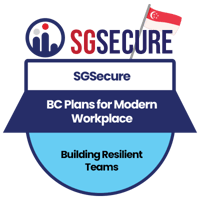
SGSecure provides training programs that teach employees techniques for managing stress, such as mindfulness, deep breathing exercises, and cognitive-behavioural strategies.
These skills help individuals maintain composure in high-pressure situations.
- Mental Health Resources
Organisations are encouraged to offer access to mental health support, including counselling services and employee assistance programs (EAPs).
SGSecure promotes the normalisation of seeking help, reducing stigma, and ensuring that employees have the resources they need to recover from traumatic events.
- Resilience Workshops
Interactive workshops focus on building personal resilience, teaching employees to adapt to change, recover from setbacks, and maintain a positive outlook despite challenges.
Enhancing Teamwork and Collaboration
Effective teamwork and collaboration are essential for executing BCM Plans successfully. SGSecure fosters these attributes through various initiatives:
- Team-Building Exercises
- SGSecure advocates for regular team-building activities that strengthen interpersonal relationships improve communication and build trust among team members.
- These exercises prepare teams to work cohesively during emergencies.
- Role Clarification and Coordination
- A clear definition of team roles and responsibilities ensures that each member understands their duties during a crisis.
- SGSecure provides frameworks for role assignment, ensuring that critical functions are covered without overlap or confusion.
- Cross-Functional Collaboration
- Encouraging collaboration across different departments enhances the organisation's ability to leverage diverse skills and perspectives during a disruption.
- SGSecure supports initiatives that break down silos and promote interdepartmental cooperation.
Leadership Development and Empowerment
Strong leadership is crucial for guiding teams through crises. SGSecure focuses on developing leaders who can inspire, make informed decisions, and maintain team morale during challenging times.
- Crisis Leadership Training
Programs designed to equip leaders with the skills needed to manage emergencies, including decision-making under pressure, effective communication, and strategic thinking.
- Empowering Managers
SGSecure encourages organisations to empower managers by delegating authority and fostering an environment where leaders can take initiative and respond proactively to emerging threats.
- Mentorship Programs
Establishing mentorship relationships helps emerging leaders develop the competencies required to handle crises, ensuring a pipeline of capable leaders for the future.
Promoting a Culture of Continuous Learning and Adaptation
A culture that values continuous learning and adaptability ensures that teams are continuously improving and ready to handle new challenges.
- Regular Training and Education
SGSecure supports ongoing training programs that keep employees updated on the latest best practices in crisis management, security protocols, and resilience strategies.
- After-Action Reviews (AARs)
Post-incident reviews allow teams to reflect on their response to disruptions, identify strengths and weaknesses, and implement improvements.
SGSecure encourages the systematic use of AARs to foster a learning-oriented mindset.
- Encouraging Innovation
Promoting an environment where employees feel comfortable suggesting and experimenting with new ideas enhances the organisation's ability to adapt to unforeseen challenges.
SGSecure supports initiatives that reward innovation and creative problem-solving.
Building Strong Interpersonal Relationships
Strong relationships within teams contribute to a supportive and cohesive work environment, which is essential during crises.
- Effective Communication Skills
Training employees in active listening, clear articulation of ideas, and empathetic communication help build stronger interpersonal connections.
SGSecure emphasises the importance of these skills in maintaining team harmony and effectiveness.
- Conflict Resolution Mechanisms
Implementing strategies for resolving conflicts amicably ensures that disagreements do not hinder team performance during emergencies.
SGSecure provides guidelines for constructive conflict resolution.
- Inclusivity and Diversity
Promoting an inclusive workplace where diverse perspectives are valued enhances team resilience by bringing varied approaches to problem-solving.
SGSecure supports diversity initiatives that strengthen team dynamics.
Encouraging Employee Engagement and Ownership
Engaged employees who feel a sense of ownership are more likely to be proactive and committed during crises.
- Involvement in BCM Plan Development
Involving employees in creating and refining BCM Plans fosters a sense of ownership and responsibility.
SGSecure encourages participatory planning processes that leverage employee insights and expertise.
- Recognition and Rewards
Acknowledging and rewarding employees for their contributions to resilience reinforces positive behaviours and motivates continued engagement.
SGSecure promotes recognition programs that highlight exceptional performance during crises.
- Feedback Mechanisms
Providing channels for employees to offer feedback on BCM Plans and resilience initiatives ensures that plans remain relevant and practical.
SGSecure supports continuous improvement using surveys, suggestion boxes, and open forums.
Leveraging Technology to Support Team Resilience
Modern technology can enhance team resilience by facilitating communication, collaboration, and information sharing.
- Collaboration Tools
Utilising platforms like Microsoft Teams or ZOOM enables seamless communication and coordination among team members, even in remote or dispersed environments.
SGSecure encourages the adoption of such tools to maintain team cohesion.
- Knowledge Management Systems
Implementing systems that store and organise critical information ensures that teams can access necessary resources during disruptions.
SGSecure supports the development of centralised knowledge repositories that are easily accessible during emergencies.
- Remote Work Capabilities
Ensuring teams can operate effectively from remote locations increases organisational flexibility and resilience. SGSecure promotes the integration of remote work technologies into BCM Plans to maintain continuity during events that restrict physical presence.
Summing Up...
Building resilient teams is a cornerstone of effective Business Continuity Planning, and SGSecure provides the frameworks and resources necessary to achieve this resilience.
By fostering psychological strength, enhancing teamwork, developing strong leadership, promoting continuous learning, and leveraging technology, SGSecure ensures that organisations are equipped to navigate and recover from crises efficiently.
Integrating these principles into your BCM Planning safeguards your workforce and fortifies your organisation's ability to maintain operational stability and thrive amidst adversity.
Disclaimer & Proper Usage of Guidebook
For details, please refer to Chapter 1, "SGSecure and Business Continuity: A Vital Partnership for Workplace Resilience."
Business Continuity Management for SGSecure Singapore |
||||
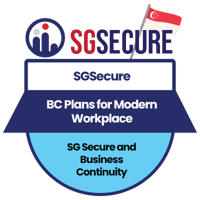 |
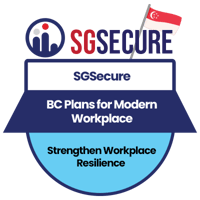 |
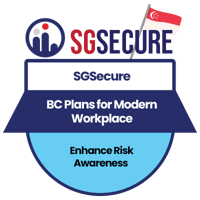 |
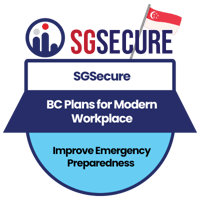 |
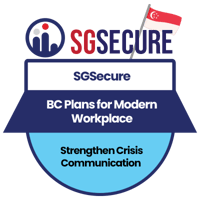 |
 |
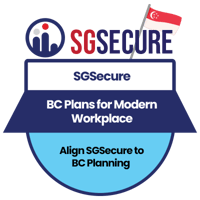 |
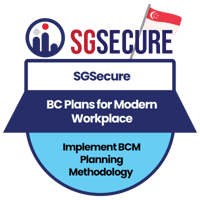 |
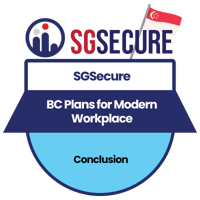 |
|
More Information About Business Continuity Management Courses

 To learn more about the course and schedule, click the buttons below for the BCM-300 Business Continuity Management Implementer [B-3] course and the BCM-5000 Business Continuity Management Expert Implementer [B-5].
To learn more about the course and schedule, click the buttons below for the BCM-300 Business Continuity Management Implementer [B-3] course and the BCM-5000 Business Continuity Management Expert Implementer [B-5].
![Register [BL-B-3]*](https://no-cache.hubspot.com/cta/default/3893111/ac6cf073-4cdd-4541-91ed-889f731d5076.png) |
 |
 |
 |
 |
 |
![FAQ [BL-B-3]](https://no-cache.hubspot.com/cta/default/3893111/b3824ba1-7aa1-4eb6-bef8-94f57121c5ae.png) |
If you have any questions, click to contact us.
|
 |
 |
 |
 |



![Email to Sales Team [BCM Institute]](https://no-cache.hubspot.com/cta/default/3893111/3c53daeb-2836-4843-b0e0-645baee2ab9e.png)

